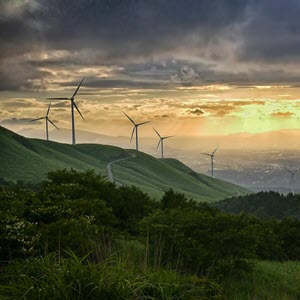Rethinking U.S.-Japan Relations through Policies on Decarbonization
Leading up to the 26th United Nations’ Conference of the Parties (COP26), both Japan and the United States laid out ambitious goals to achieve net zero for their respective economies. Notably, Japan is taking substantial steps to reduce its greenhouse gas emissions over the next 30 years, with a plan to achieve carbon neutrality by 2050. The United States has been a longtime partner of Japan and is recently recommitted to the Paris Agreement, with President Biden striving for a carbon free power sector by 2035 and a net zero emissions economy by 2050.
In this Asia Insight discussion moderated by NBR nonresident fellow Clare Richardson-Barlow, we aim to analyze these goals by rethinking policy approaches to decarbonization across administrations in the United States and Japan. As two of the largest emitters in the world, Japan and the United States have significant challenges to address over the next three decades to achieve their respective net zero goals. However, this also presents a range of opportunities for both countries to increase collaboration through research, investment, and knowledge sharing.
Clare Richardson-Barlow is an interdisciplinary social scientist whose research and teaching explores energy policy, political economy, and energy governance. She is currently a Research Fellow at the University of Leeds (U.K.) where she examines the international political economy of industrial decarbonization and energy transitions. Dr. Richardson-Barlow is also a nonresident fellow at NBR.
Runsen Zhang is an Assistant Professor at the Graduate School of Advanced Science and Engineering at Hiroshima University and a Guest Research Fellow at the National Institute for Environmental Studies in Japan. Dr. Zhang’s research interests include land use-transport interaction modeling, transport energy modeling, and low-carbon city planning.
Izuru Makihara is a Professor for Political Administrative Systems at the Research Center for Advanced Science and Technology at the University of Tokyo. Dr. Makihara’s research interests include oral history projects and Japanese political history, comparative public administration, judicial politics, and advanced public policy research.
Time Stamps
[1:34] Dr. Makihara, what political trends have you seen in Japan’s climate and sustainability agenda?
[7:35] Dr. Zhang, what sectors should we focus on in exploring Japan’s decarbonization efforts? What are the obstacles to sector-specific decarbonization that we should be paying attention to?
[16:00] How has civil society played a role in shaping Japan’s sustainable development?
[21:24] What does the role of U.S.-Japan collaboration and international cooperation play in achieving net-zero?
[27:44] You both mentioned the importance of industry and trade in achieving net-zero. Following up on this point, is there anything you think is missing within U.S.-Japan cooperation that can help better achieve both countries’ respective net-zero goals?
[31:09] Are there other examples of collaboration taking place between Japan and other countries?
[34:28] For your final words in the podcast, could you present your perspectives on whether to be optimistic for the future of U.S.-Japan cooperation?
About Asia Insight
The NBR podcast series Asia Insight features interviews with top Asia experts about key issues affecting the Indo-Pacific region, with a focus on implications for U.S. policy and businesses. Subscribe to Asia Insight on Podbean and Apple Podcasts and let us know what you think of the podcast on Twitter.
Media Contact: [email protected] or (202) 347-9767.
Asia Insight theme music is by Laura Schwartz of Bellwether Bayou.
This podcast was edited by Sandra Ward at NBR.



